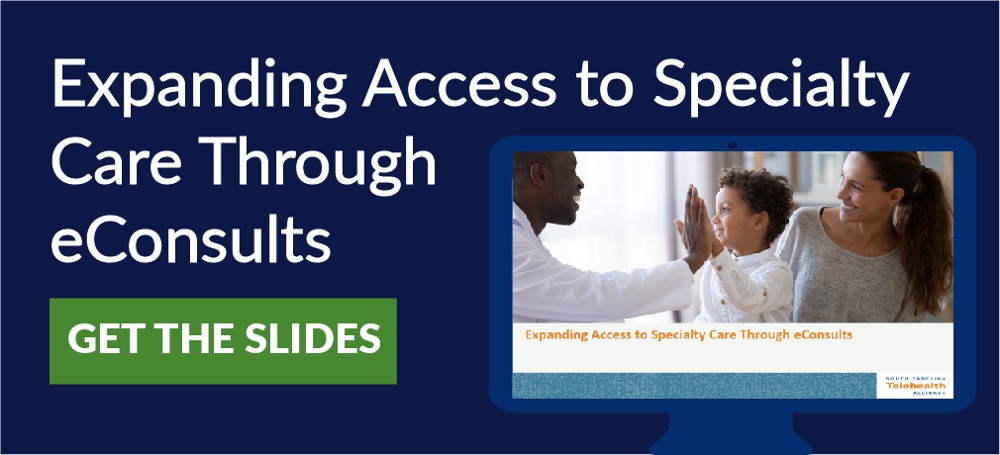EConsults as Telehealth to Improve Access to Care, Virtually

The access to care challenge for residents of rural, underserved or low-income communities—those areas that lack enough practicing physicians—is well-documented. It has been called “physician shortage,” “geographic maldistribution” or “physician clustering”—and telehealth is a go-to solution.
“Telehealth” is traditionally defined as health care delivered remotely through telecommunications technologies including computers and even televisions and telephones … but the “telehealth toolbox” is much more expansive than that definition states.
With Telehealth Awareness Week wrapping up—the first year this event was celebrated on a national level—now is a good time to consider a broader telehealth strategy beyond the typical patient-provider virtual visit and include eConsults to expand access to specialist-informed care.
What is an eConsult? And are eConsults Telehealth?
There are a few different eConsult definitions , so for the purposes of this article, an eConsult is:
- A communication between a referring and a consulting provider, often a primary care provider (PCP) and a specialist
- Asynchronous, or store-and-forward (not real-time)
- Conducted online, allowing for the secure exchange of supporting health information such as labs or images
Most of the time, a PCP submits a request for an eConsult through an online platform, sharing any relevant medical images and documents. The consulting specialist reviews the request and responds, ideally in a predetermined, set amount of time.
EConsults are indeed one way of providing telehealth, as they 1) support health care delivery and 2) use telecommunications technology to connect two providers.
An eConsult essentially expands a PCP’s specialist network, allowing physicians to use a telemedicine platform to access and seek expert advice from physicians with advanced specialty training—doctors who would otherwise be inaccessible for either the PCP or the patient due to time or other barriers.
Benefits of eConsults
As mentioned above, eConsults help alleviate access-to-care barriers. They improve patient access to specialty-informed care, decreasing wait times for specialist advice and at times altogether eliminating the need for an in-person specialist appointment. In one study in a large, urban, safety-net health system, eConsults decreased wait times, increased follow-up appointment scheduling and resolved 13% of referral requests electronically.
In South Carolina, where 27% of the population lives in rural areas, access to specialist care for rural residents is a nagging issue. The chronic condition burden is significant, and disparities exist between metro and non-metro areas. A few stats about our population:
- 6 in 10 SC adults have a chronic disease; 4 in 10 have 2 or more
- ~1.1 million adults have arthritis
- The diabetes rate in 29 out of 43 counties is greater than 15%
With 1.4 million South Carolinians living in rural areas, and such a great need for specialist care, it is understandable that access to specialists is a concern.
Implementing an eConsult program offers significant time and cost savings, too. The PCP can determine the best next step in the patient’s care journey locally, and the patient avoids unnecessary care, travel and child care expenses, time off work and reduced income. This study of the cost-effectiveness of cardiology eConsults for Medicaid patients found that an eConsult platform helped save an average of $500 per patient versus the alternative of in-person appointments.
Offering physicians eConsults can have a downstream impact on quality of care ratings, as well. In a study of eConsults at academic medical centers, patients supported eConsults as a way to improve efficiency and save time and money. Better care coordination is a natural result of eConsults, as they employ easy-to-adopt technologies that enable and document provider-to-provider communication and generally hold providers accountable to respond within specific timelines. Patients feel that care coordination in faster, more effective care.
Better access to care, time and cost savings, improved quality of care—what health care practitioner does not want this for patients? And with an ongoing shortage of specialists available for referrals in rural and underserved locations, eConsults are a promising option for health centers and hospitals looking to expand access to specialist-informed care.
Sources:
Association of eConsult Implementation With Access to Specialist Care in a Large Urban Safety-Net System, https://jamanetwork.com/journals/jama-health-forum/fullarticle/2780298
A Cost-Effectiveness Analysis of Cardiology eConsults for Medicaid Patients,
https://www.ajmc.com/view/a-costeffectiveness-analysis-of-cardiology-econsults-for-medicaid-patients?p=2
Geographic variation in spatial accessibility of U.S. healthcare providers, https://journals.plos.org/plosone/article?id=10.1371/journal.pone.0215016
Patients Assess an eConsult Model’s Acceptability at 5 US Academic Medical Centers,
https://www.ncbi.nlm.nih.gov/pmc/articles/PMC7227466/
Written by Sonya Ebeling
Sonya Ebeling is the Manager of the South Carolina Telehealth Alliance.

 © COPYRIGHT REFERWELL
© COPYRIGHT REFERWELL 